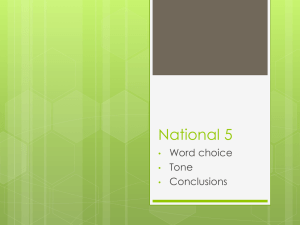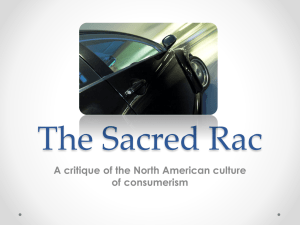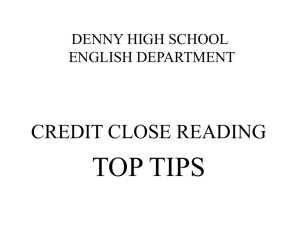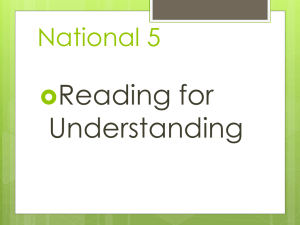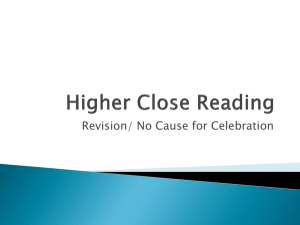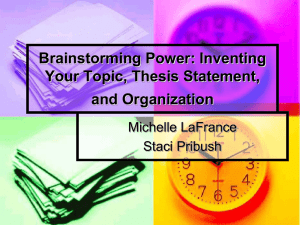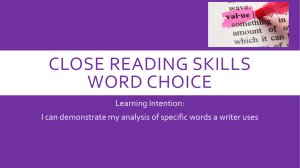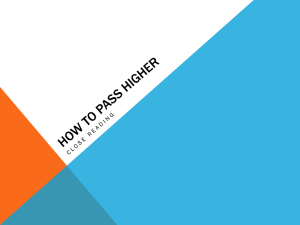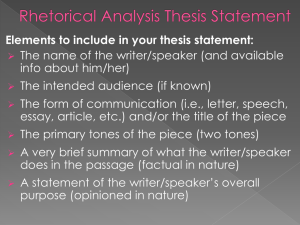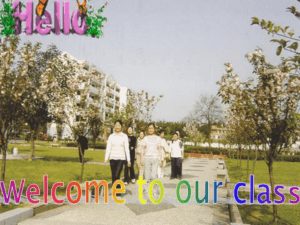Analysis and Word Choice
advertisement
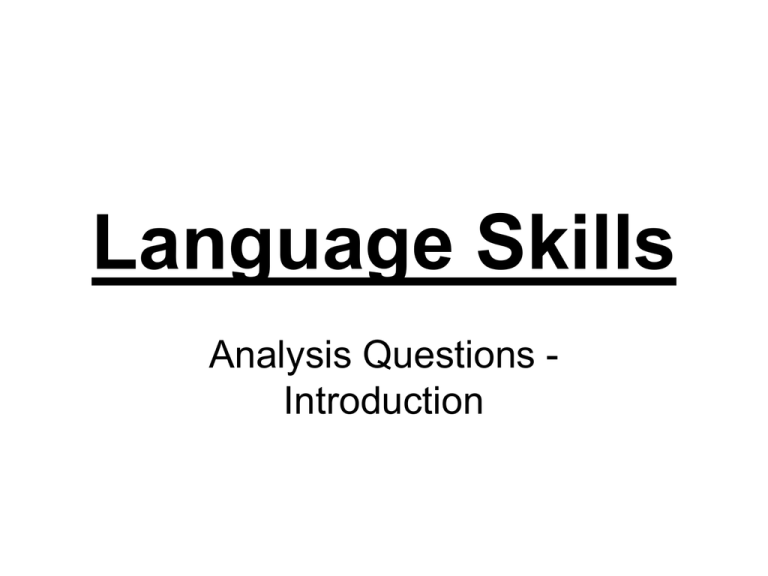
Language Skills Analysis Questions Introduction Questions about Questions Before you start to answer any question in a Close Reading passage, there are three questions you should consider: 1. Where should I look for the answer to the question? • This will mean you only have to focus on a small section of the passage when you are attempting to answer the question. • If your answer doesn’t come from the part of the passage you have been told to look in, you won’t get any marks for it, no matter how good it is. 2. How many marks is it worth? • This will give a rough indication of how much effort, time and writing you should devote to each answer. • This may also offer more specific clues about how to answer the question. 3. What type of question is it: Understanding, Analysis or Evaluation? • This will give an indication of the particular strategies you should use to attempt to answer the question. Analysis Questions • (U)nderstanding questions focus on what the writer has said. – This type of question tests your ability to demonstrate an awareness of some of the main ideas and important details included in the passage. • (A)nalysis questions focus on how the writer has said it. – This type of question tests your ability to identify and explain the language features the writer has used to put his/her ideas across. Analysis Questions – Language Features There are four main types of technique or language feature you will be asked to comment on: 1. 2. 3. 4. Structure, especially Sentence Structure Word Choice Imagery Tone Questions about Analysis and Evaluation Questions 1. Where should I look for the answer to the question? 2. How many marks is it worth? 3. What type of question is it: Understanding, Analysis or Evaluation? 4. Which language features am I being asked to comment on (sentence structure, word choice, imagery and/or tone)? Spot the Difference Read these two questions over carefully. In what way(s) are they different? 1. Look carefully at the section beginning “The first is mighty spectacle ….” (line 4) to the end of the paragraph. How does the author effectively use language to help make his points about the five qualities required to make a historical epic? (You should refer to sentence structure and word choice in your answer.) 2. Look carefully at the section beginning “The first is mighty spectacle ….” (line 4) to the end of the paragraph. How does the author effectively use language to help make his points about the five qualities required to make a historical epic? (You should refer to sentence structure or word choice in your answer.) Analysis Questions - Structure When writing an answer to an analysis question, it is helpful to apply the following structure: 1. Identify the language feature you have chosen to focus on, quoting it where necessary. 2. Explain what the feature you have identified contributes to the passage. For Example: 1. The writer uses repetition: “The boy was really, really tired.” 2. The repetition of the word “really” is used to emphasise the point that the boy was extremely tired. Close Reading Analysis Questions: Word Choice Word Choice Word Choice questions focus on the way the writer has used particular words to put his/her ideas across. When considering a writer’s word choice, there are two types of meaning that should be considered: 1. 2. Denotation: The most specific or direct meaning of a word. Connotation: An additional suggested meaning which can be taken from a word. When asked to comment on word choice, you should re-read the section of the passage the question directs you to, attempting to find examples words that carry interesting connotations which will help to answer the question you are answering. Connotations The connotations of a particular choice of word can imply a wide range of meanings. Here are just a few: Strong emotional involvement: • Domestic violence is a particularly disgusting crime. A degree of formality / informality: • Some people might consider it mad to spend five hundred pounds on Christmas presents for their children. Additional information about the way an action is carried out: • “Stopped careering through the corridors!” the teacher shrieked at the bemused pupil. Word Choice - Structure When commenting on the use of effective word choice, it can be helpful to consider doing the following: 1. Identify the specific word being used – quote it. 2. Explain what the word you have identified contributes to the passage, by stating its connotations (what it suggests). For example: “The Syrian government’s attitude towards the violent acts that have taken place in the country is an utter travesty!” “travesty” suggests the writer’s disgust at the way the Syrian government has dealt with recent violence in Syria. 1. Imagery – Class Examples Comment on the writer’s use of imagery in the paragraph you have been given. 2. Word Choice – “Blackberry-picking” Consider the following extract from the poem: Round hayfields, cornfields and potato-drills We trekked and picked until the cans were full, How does Heaney’s word choice illustrate the great lengths the children went to to gather the berries? 3. Word Choice – “Nineteen Eighty-Four” Re-read from page 83 “For the rest of the morning…” to 84 “…that he was able to think continuously.” Comment on Orwell’s word choice, explaining how it helps to show Winston’s emotional state at this point in the novel. Word Choice – Example 1 Comment on the writer’s use of word choice in the following extract: I staggered to my feet and lugged my bags over my shoulder before stumbling homeward, while my dogs eased themselves to their feet, yawned luxuriously and wandered after me. Word Choice – Example 2 Comment on the writer’s use of word choice in the following extract: Miller leaned forward and began to talk. I’ve listened to your twisted mouthings till I’m sick to the guts. What you did sickened and revolted the whole of civilised mankind and left my generation a heritage of shame to live down that’s going to take us all the rest of our lives.
